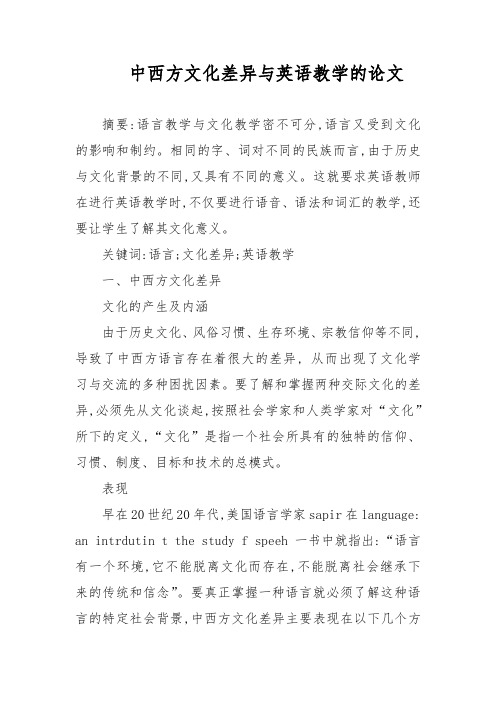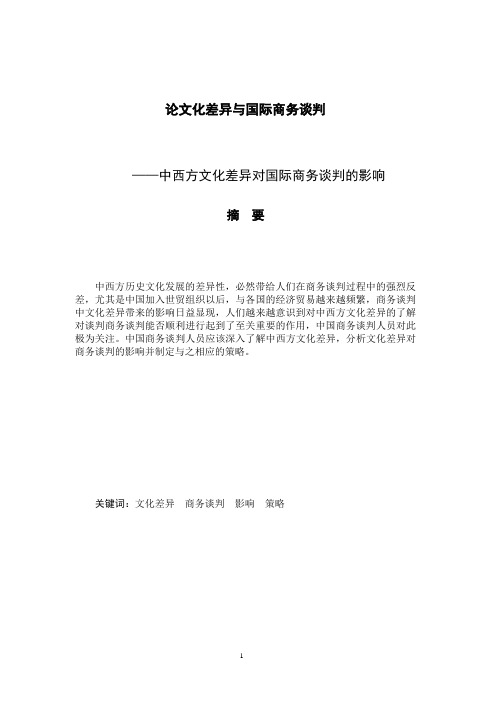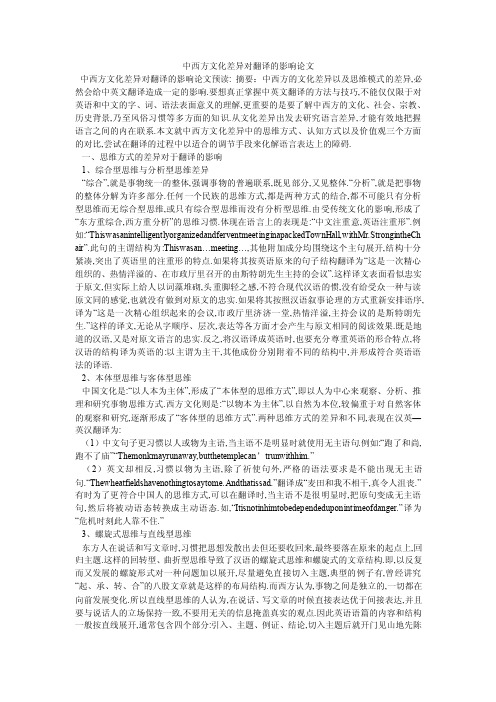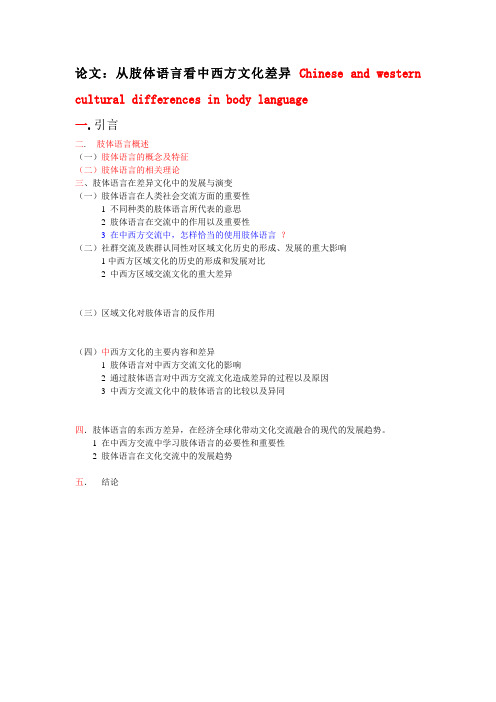浅谈中西方文化的英语论文
英文本科毕业论文《从颜色词看中英文化差异》.doc

从颜色词看中英文化差异摘要我们生活在五彩缤纷、五颜六色的世界中,颜色的多样性造成了与之相对应的颜色词的丰富多彩。
颜色词除了可以表示最基本的大自然绚丽色彩的意义以外,在某种程度上也体现了人类的一些价值观和审美观。
在这种情况下,颜色词已不单纯是表示客观颜色的指称意义了,而是被赋予了不同的象征意义,而不同文化背景的人们对颜色的感知和审美体验是同中有异,异中有同。
本文将选取几个典型的颜色词来分析颜色词在中英文化中所存在的共性和差异性,探讨形成这种差异性的各种原因,并浅略讲述其对跨文化沟通、交流的影响及解决办法。
关键词:颜色词联想意义文化差异跨文化交际Chinese and English Cultural Differences Reflected in the ColorTermsAbstractAs we live in a colorful world, the diversity of colors results in the diversity of the equivalent color terms. Apart from expressing the most basic colors in the nature, colors, to some extent, represent some values and aesthetics of the mankind. In this case, color terms no longer merely express the designative meaning of the objective colors. They are given different symbolic meanings. People with different cultural background have different perceptions and aesthetic experience about colors, in which similarities can be found.This paper will select a few typical color terms to analyze the similarities and differences of color terms in Chinese and English cultures, discuss various reasons for these similarities, and touches upon their influence on the cross-cultural communication and exchanges and the solutions.Key words:color terms, associative meaning, cultural differences, cross-cultural communication目录引言 (1)1、中英两种文化中的颜色词及在跨文化交际中的翻译误区 (1)1.1、中英两种文化中的颜色词 (1)1.2、跨文化交际中颜色词的翻译误区 (1)2、颜色词在中英文化中的不同内涵,其共性与差异性 (1)2.1、白色(white) (2)2.2、红色(red) (2)2.3、黄色(yellow) (3)3、颜色词在中英文化中形成差异性的原因 (3)3.1、文化差异的原因 (4)3.2、价值取向的原因 (4)3.3、思维方式的原因 (5)3.4、宗教方面的原因 (5)3.5、其它原因 (5)4、颜色词的差异性对跨文化交流的影响 (6)5、在跨文化交流中应如何正确理解和翻译颜色词 (6)5.1、直译法 (6)5.2、意译法 (6)5.3、更换颜色词的翻译法 (7)5.4、增加颜色词的翻译法 (7)6、结语 (7)7、参考文献 (8)从颜色词看中英文化差异引言色彩与人类的生活息息相关,是人类认识世界的一个重要领域。
中西方文化差异与英语教学的论文

中西方文化差异与英语教学的论文摘要:语言教学与文化教学密不可分,语言又受到文化的影响和制约。
相同的字、词对不同的民族而言,由于历史与文化背景的不同,又具有不同的意义。
这就要求英语教师在进行英语教学时,不仅要进行语音、语法和词汇的教学,还要让学生了解其文化意义。
关键词:语言;文化差异;英语教学一、中西方文化差异文化的产生及内涵由于历史文化、风俗习惯、生存环境、宗教信仰等不同, 导致了中西方语言存在着很大的差异, 从而出现了文化学习与交流的多种困扰因素。
要了解和掌握两种交际文化的差异,必须先从文化谈起,按照社会学家和人类学家对“文化”所下的定义,“文化”是指一个社会所具有的独特的信仰、习惯、制度、目标和技术的总模式。
表现早在20世纪20年代,美国语言学家sapir在language: an intrdutin t the study f speeh一书中就指出:“语言有一个环境,它不能脱离文化而存在,不能脱离社会继承下来的传统和信念”。
要真正掌握一种语言就必须了解这种语言的特定社会背景,中西方文化差异主要表现在以下几个方面:1、价值观与道德标准的差异西方人崇拜个人奋斗, 以个人取得的成就自豪。
相反, 中国文化却提倡谦虚谨慎。
然而, 中国式的自我谦虚却常常使西方人大为不满。
yur english is very gd. n, n, y english is very pr.这种谦虚, 在西方人看来, 不仅否定了自己, 还否定了赞扬者的鉴赏力。
在西方文化中,与“自我”相关的观念已经根深蒂固。
如“self-absrptin 、self-adiratin 、self-ultivatin ”等等。
西方社会盛行的是个体主义 ,强调个人自由、不受约束。
而中方文化强调集体利益高于个人利益,“先国家,后集体,再个人,先利民,再利已”的话语随处可见。
2、社会关系的差别称谓及称呼:英语中的称谓比汉语中要少得多。
例如,usin 一词,对应汉语的表兄、表弟、表姐和表妹等。
中西饮食文化的差异 论文

Hunan Information Science V ocational CollegeGraduation ThesisSubject: A Comparison of Food Culture BetweenChina and Western CountriesName: Tang WenStudent No.: 1103020239Specialty and Class: Business English,Class 2Department: Department of Hunan and ArtsSupervisor: Fang leiyiDate:2014-3-16ContentsIntroduction (1)1.Introduction to Diet Idea (2)1.1Diet Idea in Western Countries (2)1.2Diet Idea in China (3)2.The Differences of Diet Object Between China and Western Countries (3)2.1Materials of Food (3)2.2Differences of Diet Object (4)2.2.1Chinese Food Advocates.. Vegetarianism (5)2.2.2Western Food Pay Attention to Nutrition (5)3.The Different Method Of Diet (6)3.1Dinning Way (6)3.2 Table Ware (6)3.3 Dinning Etiquette (7)4.The Future Prospects Of Chinese and Western Diet (8)Conclusion (9)Bibliography (10)Acknowledgements (11)摘要在悠久的历史文化中,中西方不同的思维方式和处世哲学造就了中西文化的差异,从而造就了中西方饮食文化的差异。
浅谈中西方文化中狗的不同内涵

浅谈中西方文化中“狗”的不同内涵Diffent Connotations of “Dog” in Chinese and Western Cultures作者:高书立(Slade gao)[摘要]语言是文化的载体,民族文化和社会背景的差异赋予同一动物词语不同的内涵。
“狗”在汉语里往往包含着贬义,而在英语里却常常带着褒义。
文章通过对英语“狗”的词汇的研究,论述了“狗”在中西两种文化间的差异以及在语言这一层面上的具体内涵的不同。
[关键词] 狗文化内涵差异中西方文化[Abstract] Language is a cultural carrier,different social backgrounds and national cultures have a great effect on the cultural connotations of vocabulary.“Dog” is a commendatory term in English while it is a derogatory term in Chinese. This paper utilizes the datafrom a large corpus to analyze the words signifying“dog”and explores the cultural differences between Chinese and Western and their various connotations.[Keywords] dog;cultural connotations;differences;Chinese and western cultures一,引言任何民族的语言都深深根植于其民族的文化之中,既是民族文化的一部分,又是其民族文化的载体。
中国文化和西方文化作为两种不同的文化体系,在语言文化内涵方面存在着巨大的差异,即便是作为同意实体的动物名称“狗”,其所包含的寓意及其文化内涵也迥然不同,各自形成了独特额的狗文化观,本文主要从语言学和跨文化交际的角度,将语言知识和文化知识结合起来,剖析狗在两种文化中的不同内涵,努力使中西方文化之间的沟通更加的准确和有效。
中西方文化差异与英语学习

中西方文化差异与英语学习Language Culture has always been a long lasting topic by many linguists in the world, especially the differences of the eastern cultural and the western cultural. The thesis below is talking about the point from the diversities of Chinese and English. There are many aspects, including natural, custom, religion, historical allusion, made of thinking, individualism and so on. Chinese and English are both very rich in the vocabulary, and the cultures of them are also broad and profound. It needs a good knowledge to research it. In this article, there is only a part of it in researching this topic. It gives a simple comment on the comparing the eastern culture and the western culture through the language phenomenon.文化是一个社会群体中各个成员的信仰、观点、风俗、行为、社会习惯等的总和。
而语言则是思想的具体表现方式。
语言和文化不可分割,它们相互影响,相互依靠。
从学习英语我们能够看出使用该语言的社会文化,看到西方社会的自然环境、生产劳动、风俗习惯、宗教信仰、历史典故、思维方式等。
中西方文化差异对国际商务谈判的影响 毕业论文_论文化差异与国际商务谈判

论文化差异与国际商务谈判——中西方文化差异对国际商务谈判的影响摘要中西方历史文化发展的差异性,必然带给人们在商务谈判过程中的强烈反差,尤其是中国加入世贸组织以后,与各国的经济贸易越来越频繁,商务谈判中文化差异带来的影响日益显现,人们越来越意识到对中西方文化差异的了解对谈判商务谈判能否顺利进行起到了至关重要的作用,中国商务谈判人员对此极为关注。
中国商务谈判人员应该深入了解中西方文化差异,分析文化差异对商务谈判的影响并制定与之相应的策略。
关键词:文化差异商务谈判影响策略A bstractIn the development of Western historical and cultural differences, is bound to bring people to the process of business negotiations in a strong contrast, especially after China's accession to the WTO, with more frequent economic and trade, business negotiations, the impact of cultural differences become more and more people become more aware of cultural differences of Chinese and Western understanding of business negotiations in the negotiations can proceed smoothly and played a crucial role in business negotiations in China are extremely concerned about the staff. Chinese business negotiators should be a deeper understanding of Chinese and Western cultural differences, analysis of cultural differences affect business negotiations and to develop corresponding strategies. Key words:Cultural differences business negotiations impact strategy目录1 绪论 (5)2 国际商务谈判与文化差异 (6)3 中西方文化对国际商务谈判的影响 (7)3.1 语言差异及非语言差异对国际商务谈判的影响 (7)3.2 价值观差异对国际商务谈判的影响 (8)3.3 风俗习惯对国际商务谈判的影响 (10)3.4 思维方式差异对国际商务谈判的影响 (11)3 应对国际商务谈判中文化差异的策略 (13)4.1 谈判前做好充分的准备 (13)4.2 克服沟通障碍 (13)4.3 树立跨文化宽容意识,学会换位思考 (14)4.4 发挥自身的文化优势 (14)4.5组建合理的谈判队伍 (14)结论 (15)致谢 (16)参考文献 (17)论文化差异与国际商务谈判——中西方文化差异对国际商务谈判的影响1 绪论文化差异对国际商务谈判影响方面的研究主要是由欧美学者进行的,特别是法国、荷兰、瑞典、阿根廷和俄罗斯。
中西方文化差异对翻译的影响论文

中西方文化差异对翻译的影响论文中西方文化差异对翻译的影响论文预读: 摘要:中西方的文化差异以及思维模式的差异,必然会给中英文翻译造成一定的影响.要想真正掌握中英文翻译的方法与技巧,不能仅仅限于对英语和中文的字、词、语法表面意义的理解,更重要的是要了解中西方的文化、社会、宗教、历史背景,乃至风俗习惯等多方面的知识.从文化差异出发去研究语言差异,才能有效地把握语言之间的内在联系.本文就中西方文化差异中的思维方式、认知方式以及价值观三个方面的对比,尝试在翻译的过程中以适合的调节手段来化解语言表达上的障碍.一、思维方式的差异对于翻译的影响1、综合型思维与分析型思维差异“综合”,就是事物统一的整体,强调事物的普遍联系,既见部分,又见整体.“分析”,就是把事物的整体分解为许多部分.任何一个民族的思维方式,都是两种方式的结合,都不可能只有分析型思维而无综合型思维,或只有综合型思维而没有分析型思维.由受传统文化的影响,形成了“东方重综合,西方重分析”的思维习惯.体现在语言上的表现是:“中文注重意,英语注重形”.例如:“Thiswasanintelligentlyorganizedandferventmeeti nginapackedTownHall,withMr.StrongintheCh air”.此句的主谓结构为:Thiswasan…meeting…,其他附加成分均围绕这个主句展开,结构十分紧凑,突出了英语里的注重形的特点.如果将其按英语原来的句子结构翻译为“这是一次精心组织的、热情洋溢的、在市政厅里召开的由斯特朗先生主持的会议”.这样译文表面看似忠实于原文,但实际上给人以词藻堆砌,头重脚轻之感,不符合现代汉语的惯,没有给受众一种与读原文同的感觉,也就没有做到对原文的忠实.如果将其按照汉语叙事论理的方式重新安排语序,译为“这是一次精心组织起来的会议,市政厅里济济一堂,热情洋溢,主持会议的是斯特朗先生.”这样的译文,无论从字顺序、层次,表达等各方面才会产生与原文相同的阅读效果.既是地道的汉语,又是对原文语言的忠实.反之,将汉语译成英语时,也要充分尊重英语的形合特点,将汉语的结构译为英语的:以主谓为主干,其他成份分别附着不同的结构中,并形成符合英语语法的译语.2、本体型思维与客体型思维中国文化是:“以人本为主体”,形成了“本体型的思维方式”,即以人为中心来观察、分析、推理和研究事物思维方式.西方文化则是:“以物本为主体”,以自然为本位,较偏重于对自然客体的观察和研究,逐渐形成了“客体型的思维方式”.两种思维方式的差异和不同,表现在汉英—英汉翻译为:(1)中文句子更习惯以人或物为主语,当主语不是明显时就使用无主语句.例如:“跑了和尚,跑不了庙”“Themonkmayrunaway,butthetemplecan’trunwithhim.”(2)英文却相反,习惯以物为主语,除了祈使句外,严格的语法要求是不能出现无主语句.“Thewheatfieldshavenothingtosaytome.Andthatissad.”翻译成“麦田和我不相干,真令人沮丧.”有时为了更符合中国人的思维方式,可以在翻译时,当主语不是很明显时,把原句变成无主语句,然后将被动语态转换成主动语态.如,“Itisnotinhimtobedependeduponintimeofdanger.”译为“危机时刻此人靠不住.”3、螺旋式思维与直线型思维东方人在说话和写文章时,习惯把思想发散出去但还要收回来,最终要落在原来的起点上,回归主题.这样的回转型、曲折型思维导致了汉语的螺旋式思维和螺旋式的文章结构.即,以反复而又发展的螺旋形式对一种问题加以展开,尽量避免直接切入主题,典型的例子有,曾经讲究“起、承、转、合”的八股文章就是这样的布局结构.而西方认为,事物之间是独立的,一切都在向前发展变化.所以直线型思维的人认为,在说话、写文章的时候直接表达优于间接表达,并且要与说话人的立场保持一致,不要用无关的信息掩盖真实的观点.因此英语语篇的内容和结构一般按直线展开,通常包含四个部分:引入、主题、例证、结论,切入主题后就开门见山地先陈述段落的中心思想,即主题句,再分点对主题进行阐述,最后得出结论.在语言表达上表现为:“英语句式结构多为重心在前、头短、尾长.”而“汉语句式结构重心多半在后,头大、尾小.”如:“Imetwithmyhigh-schoolclass-mateattheentranceofthetheatreat7:00yesterdayevening,whomIhadn’tseenfouryears.”应译为:“昨晚7点在剧场门口,我碰到了4年未见面的中学同学.”二、认知方式的差异对翻译的影响在看问题的方面也是存在很大差异,“中国强调从大到小方式去看,而西方强调由小到大的方式”.如,在人的姓名的介绍和书写,以及时间、地址的表达方式上,体现了东西方思维方式中的认知差异.在中国,地址和时间的书写都是从大到小,从整体到局部;而西方文化则正好相反,他们是由小到大的排列.对颜色的认知也可以看出中西方文化的差异,在进行英汉翻译时,也需引起足够的重视.例如:blacktea红茶;blackandblue青一块紫一块;whiteday黄道吉日;white-hairedboy红人;嫉妒的眼红turngreenwithenvy;黄色笑话bluejoke.三、价值观的差异对翻译的影响中国文化,以儒家文化为主,其种族亲属和社会关系表达得十分清楚和严格,不容丝毫的含混和马虎.而西方文化是比较崇尚新教、个体文化价值的,同时也崇尚个人主义,个人至上主义价值观是西方文化的特点这种价值观使得亲属关系就笼统宽松得多.两种不同价值观的文化影响了两种不同的语言,其两种语言在表达上的区别为:例如:“AnEnglishman’shouseishiscastle.(英国人的家是他们的城堡)”,意味着没有理由不可以去无故打扰别人或没有预约不可以贸然拜访某人;“Evenreckoningmakelongfriends(明算账,友谊长);”“Tel lmoneyafteryourownfa-ther(亲父子明算账)”等,这些都表明西方人的个人主义价值观.而受中国文化的以谦虚为美德的价值观的影响,一般会对别人的赞扬、夸奖常礼仪性地予以否认.如“Y ouspeakexcellentEnglish”,中国人常说“no,no”;而西方人崇尚自我奋斗,常会对别人的赞扬乐于接受并表示感谢,积极地回答“Thankyou!”.综上所述,“文化翻译”的确是在“文化研究的大语境”下做翻译,翻译的好要有九份文化,一份语言.了解文化的差异,认识语言的本质,把握其中的客观规律,熟悉文化的异同,才能真正做好翻译工作.S*本文为银川能源学院校级科研课题(2012—KY-P-40)阶段性成果之一参考文献:[1]章和升、王云桥,英汉翻译技巧[M],北京:当代世界出版社,1997.[2]贾玉新,跨文化交际学[M],上海:上海外语教育出版社,1997.[3]连淑能,英汉对比研究[M],北京:高等教育出版社,1993.。
从肢体语言看中西方文化差异论文提纲

论文:从肢体语言看中西方文化差异Chinese and western cultural differences in body language一.引言二.肢体语言概述(一)肢体语言的概念及特征(二)肢体语言的相关理论三、肢体语言在差异文化中的发展与演变(一)肢体语言在人类社会交流方面的重要性1 不同种类的肢体语言所代表的意思2 肢体语言在交流中的作用以及重要性3 在中西方交流中,怎样恰当的使用肢体语言?(二)社群交流及族群认同性对区域文化历史的形成、发展的重大影响1中西方区域文化的历史的形成和发展对比2 中西方区域交流文化的重大差异(三)区域文化对肢体语言的反作用(四)中西方文化的主要内容和差异1 肢体语言对中西方交流文化的影响2 通过肢体语言对中西方交流文化造成差异的过程以及原因3 中西方交流文化中的肢体语言的比较以及异同四.肢体语言的东西方差异,在经济全球化带动文化交流融合的现代的发展趋势。
1 在中西方交流中学习肢体语言的必要性和重要性2 肢体语言在文化交流中的发展趋势五.结论1 General ideas of body languageA the definition of body languageB the relative theory of body language2 the development and exchange of body language in different culturesA the importance of body language in human ’s communication1. Introduction (1)2. The necessity and importance of learning body language on nonverbal communication (2)3. The concrete types and application of the body language (3)3.1 Types of body language (3)3.1.1 Distance between people conversing (3)3.1.2 Physical contact (3)3.1.3 Eye contact (4)3.1.4 Smiles and laughter (6)3.1.5 Gestures (6)3.2 Application of the body language (6)3.2.1 Greetings (6)3.2.2 Signs of affection (8)3.2.3 Physical contact in life (8)3.3 A comparative study of Chinese and American body language (9)4. Conclusion (12)Introduction1. General ideas of body language 52. ?The different kinds of body language 62.1 Manual speech2.2 face expression2.3 posture expression3. ?The function of body language4.How to use body language5. The importance of body language浅谈非语言交际中的身势语摘要“身势语”同语言一样,都是文化的一部分。
- 1、下载文档前请自行甄别文档内容的完整性,平台不提供额外的编辑、内容补充、找答案等附加服务。
- 2、"仅部分预览"的文档,不可在线预览部分如存在完整性等问题,可反馈申请退款(可完整预览的文档不适用该条件!)。
- 3、如文档侵犯您的权益,请联系客服反馈,我们会尽快为您处理(人工客服工作时间:9:00-18:30)。
I ntroduction to Chinese and western cultural differencesLanguage is the product of society, is the crystallization of human history and culture. It embodies a national passed from generation to generation of social consciousness, historical culture, customs and so on various aspects of human society all features. Different cultural background and cultural traditions, make Chinese and western ways of thinking, values, code of conduct and way of life, etc, there are also considerable cultural differences. Language is the carrier of culture, vocabulary is the concentration of the cultural information, is an important part of language, it reflects the culture of the development and change, but also directly reflect the cultural differences.In China more than two thousand years of feudal society in the process of history, Confucianism has dominated the deep-seated string dominance, in Chinese society has a very deep and long influence. Idea of a Chinese has always been to fall back as a classic, this is in the Confucian "golden mean" as the basic rules of behavior. The ideal of "in" is the Confucian pursuit, life to life Confucian benevolence, righteousness, propriety, wisdom, letter of ideological and moral concepts as each person's behavior guide, treat people, want to consider temperature, quite good, purge, thrifty, let, proud of modest, to be open-minded, to oppose overlyreveal your self expression. Therefore, Chinese culture reflects the cultural characteristics of mass, the mass cultural characteristics are not allowed to put personal values take precedence over group interests.The formation of western values can be traced back to at least the Renaissance movement. The guiding ideology of the Renaissance is humanism, namely upholding individual as the center, to promote individualism first, to develop their self expression. The concept of "humility" in western culture value is ignored. The people worship of life is the "strong" and "hero". Capable, talented the strong get reused, lack of confidence can only fall behind the weak or eliminated by relentlessly. Therefore, western culture reflects the individual cultural characteristics of this kind of individuality cultural characteristics of advocating personal values take precedence over group interests above.Because of this, for some words between Chinese and western two cultures with mixed reviews have different colour. The word such as: ambition itself has mixed reviews, two kinds of meaning. Chinese use the derogatory sense, said "ambition", while American and British people take its good, said "ambition". Aggressive one word, the Chinese are commonly used to describe someone "provocative" "Aggressive", and the American people are used to describe someone "Aggressive enterprising, pioneering spirit".Mass culture in our country, attaches great importance to family andfriends, relationships, see it as a cell of society; In western countries, advocating independence independence. Chinese people attach importance to the traditional manner, father and son, seniority, hierarchical, inAnglo-American countries, equal status between the elder and the younger generation, no object boundaries, young and old to more friends. Chinese traditional ideas have always been advocating "four generations" "family reunion", since ancient times have "parents, not travel" word old adage; In Anglo-American countries, children under the age of 18 still living at home depend on their parents life is unthinkable, they must rely on their own hands to live independently. Also, older parents even lost life self-care ability, general won't drag their children, are they usually live in old-folk's homes, by the social attention.Culture of different values in different. The word such as lod, there have been "aged to respect" the Chinese tradition. "Old" in Chinese express the concept of respect, such as ancestor, old man, old man, and so on. "Old zhang", "wang", showing the respect and affection, "old" is a big "if". The Chinese often proud of age. When talking with others, age, the older the qualification, also will get the respect of others. "Ginger is old spicy. In our opinion, the elder not only is the embodiment of the wisdom and also a symbol of prestige. Western countries, however, very few people willing to seniority and self-proclaimed "old". In their view, the "old" is synonymouswith "useless", and "unfashionable" "old and useless" meaning together. British and American people don't like others say his old, not seniority. In western culture, they treat age as an individual is extremely important privacy. Especially women, more taboo asked her age. Even willing to talk about their age, also want others to guess their age, but at this point, the expectations of the real purpose of compliments they look younger than actual age, is how young. And, as the British and American people taboo word mo deep fat, see who had said the fat would frustrating and disgust. When it comes to fatmeat (fat) will be considered worthless the throw away waste. And the Chinese saw children say "fat" and "fat", said to the child's affection, for the adult man said fat has the meaning of "fat", is "full" for adult women speak fat, there is praise and flattery. Daily life work, also often hear people say something is a piece of "fat" or the words of a message is a "nice", the implication is rare things or the location of the most welcome. Chinese people not only do not hate fat, and the praise.The same thing, different cultural figure, opinions vary widely. Chinese people despise the dog, it is "running dogs" "dog" "dog" "heels dog" "a coward" "or" "seeing dogs were low," and so on. In western countries, people appreciate the brave and faithful dog, praise to the dog also common occurance, and compare people to the dog. Such as aluckdog (lucky), loveme, love my dog, love me, love my dog), Every dog has his day. (Everydog has his day). Describe people "very ill" with sickas a t. "Too tired" is a dog - tired. On the contrary, the Chinese are very like cat, people use "ChanMao metaphor" greed, very affectionate composition, and in western culture, "cat" was used to describe "harboring woman".Chinese and western cultural differences in addition to performance in values, customs differences thereof, and living environment, religious beliefs, the different related historical allusion.1, the survival environment:The generation of the language is closely related to people's labor and life. Britain is an island country, seafaring once led the world in history; And the han nationality in the Asian continent life reproduction, people's life cannot leave the land. Metaphor is to spend money to waste, lavishly, English is to spend money like lvater, while Chinese is "money". In English, there are many idioms on the boat and water, in Chinese, not completely the same corresponding idioms, such as to rest on one's OARS (temporary rest a while), to keep one's head above water (struggling to survive), all at sea (head), and so on.In Chinese culture, "dongfeng" is "spring wind", summer often associated with the summer heat, the sun like fire ", "the scorching sun" is often used to describe the summer words. Britain is located in the westernhemisphere, north temperate zone, oceanic climate, news report spring is west wind, famous British poet Shelley's ode to the west wind "is the song of spring. The British summer is the season of warm and pleasant, with "cute" "moderate" connected "good". Shakespeare in his sonnet compare love to summer, shall I compare thee to a summer's day? / Thou art more lovely and more temperate.2, aspects of religious beliefBuddhism was introduced into China has one thousand years of history, people believe in "Buddha" in all around the world, and a lot of language, such as "we" "don't burn incense, spare time cramming", etc. In many western countries, especially in Britain and the United States, people believe in Christianity, related with "God else those who help more (God helps self-help)" Go to hell (hell) such a curse.3, historical allusionsIn Chinese and English two kinds of language has a great number of formed by historical allusion. These idioms simple structure, profound, is often can't from literal meaning to understand and translation. Such as "imitation" and "pecking" bad attitude "and so on. The only weakness in English Achilles' heel (), meet one's Waterloo (lose), Penelope's web (always finish work), a Pandora 's box. (Pandora's box of disaster, the trouble, the root of evil), etc.Due to various reasons, led to such as the many cultural differencesbetween Chinese and western, with the cultural differences andcross-cultural communication barriers. The process of modernization accelerates the spiritual and material circulation of products, to include ethnic groups in a common "global village", intercultural communication become each nation indispensable part in life. If an enterprise want to make their products sell well in the international market, not only need high level of economy and technology, and need to have a thorough understanding of foreign culture, make the product in the packaging design and practical aspects in accordance with the foreign people's psychological needs. In China, such as, "dragon (dragon)" is our spiritual totem, is a symbol of good fortune and power, that prides itself on Chinese also as descendants of the dragon, in western eyes, however, the "dragon", there is no this special emotions, even understand "dragon" as a denial of the terrible monster. If a entrepreneurs don't know much about this, will be decorated with "dragon" products into the international market, just think of this product can stimulate the desire to buy of westerners? Can create high benefit to the enterprise. Therefore, to overcome cultural differences caused by communication barriers has become a common problem faced by the whole world. As a high school English teacher, should pay attention to the teaching of language ability in English teaching, special attention should be paid to developing students' communicative competence in daily teaching, the language of the role of cultural differences in English teaching as an important issue.Chinese and western cultural differences in English learning to middle school students the disturbance of mainly manifested in the following aspects:1, the salutationThe Chinese relatives appellation has a tendency to generalize the use of commonly used in the relatives between: young people say "uncle" "aunt" to your elders; To peers said "big brother" "big sister". But in English, kinship appellation is not widely used in social. If our mother tongue is English elders said "Uncle Smith," "Auntie Brown", the other party will feel is not too sweet. Close connection of English culture, only to use such relatives appellation behind and don't take surname, with only names, such as "Uncle Tom".And as the students know the meaning of the teacher is "teacher", is correspondingly called "teacher Wang", "the teacher Wang". In fact, the teacher is a kind of professional in English; Chinese have the tradition of respect, "teacher" is not only a kind of profession, and become a kind of known to man. Due to the cultural differences, students easy to understand: Wang = the Teacher Wang. In addition, in the Chinese traditionally called "Tang Secretary" "a Nurse called" Secretary Tang, Nurse Zhang,english-speaking people feel incredible sound. In English call people generally use Mr., Miss, Mrs., etc.2, thanks and appreciationGenerally speaking, we Chinese between family members rarely use"thank you". If used, will sound very strange, or is on the relationship between the distance. . In English speaking countries "Thank you" for all occasions, almost all people, even if the parents and children, between brothers and sisters are no exception. Send you a bottle of drink, prepare a dinner table, people would say, "Thank you. The" public whether others help you, you are main "Thank you..." This is at the very least etiquette.English speaking countries, if you want, you don't have to refuse, saying "if Yes, do" don' just say "No, thanks.". It also fully embodies the Chinese implicative and different styles of English national people magnanimous frank.3, praiseIn english-speaking countries, praise is commonly used as primers of conversation. Praise the main content of personal appearance, appearance, new things, personal belongings, personal the great job in some way, etc. Usually praise others only when the appearance of praise her efforts to dress up as a result, instead of her natural beauty. Therefore: praise others hair many, few others beautiful hair. For other people's praise, the most common answer is: Thank you. For example, A: Your skirt looks nice.B: Thank you.4 privacyThe Chinese first met asked about age, marriage, income, more concern, and the english-speaking countries is to compare, think that theseare personal privacy. As in JEFC Book 1 such dialogue in Lesson # 16: "How old are you, Mrs Read?" "Ah, it 's a secret!" Why does Mrs Read refused to tell her age? Because people want to English countries appear energetic in each other's eyes, youth and secretive about their actual age, women in particular. As Chinese said care about "where are you going?" "What are you doing?" In English will be spying on the privacy of others questioned, monitoring the words of others and unpopular.5, say "hello"The Chinese daily say "hello" is used to ask: "did you eat?" If you're like English country people say this, they think you want to please them to dinner, English national people say "hello" usually in the weather, health, traffic, sports and hobbies for topic.6, holidayThe cultural differences in China and english-speaking countries also significantly manifested in the festival. In addition to China andenglish-speaking countries common holiday (such as New Year 's Day), the two sides also each have their own unique festival. China is the Spring Festival, the Dragon Boat Festival, Mid - Autumn Day, etc.,english-speaking countries have "Valentine 's Day (Valentine's Day), its (Easter), April fool' s Day), April fool's Day, Thanks Giving Day (ThanksgivingDay), Christmas Day (Christmas Day), etc. Chinese and western Festival customs is also very different. In the holiday, sent gifts for others, the Chinese tend to decline, behave helplessly accept, accepted generally do not open the face to face. If, jubilant open and face to face can cause" greedy ". In English culture, people send gifts to others, is generally going to open the praise for a face to face, and glad to say thank you.7, cultural connotations of vocabularyEnglish vocabulary in the long-term use of accumulated the rich cultural connotation, so in the teaching must pay attention to the cultural meaning of the English vocabulary, in case the students simply make subjective evaluation from the word itself. The word such as red in english-speaking countries or, in China, red is often associated with celebration or festival days, "red - letter days are there in English (holiday). Especially in China, red symbolizes revolution and socialism and other positive significance, but in "red" in English also means that the risk or make people angry, such as "red flag" (is angry). And when you see business "in the red" in English, don't think that is a profit, on the contrary, is said losses, liabilities.Cultural education in the teaching, the method is varied, teachers should adopt a flexible approach to improve students' sensitivity to the culture, cultivate cultural awareness, so that they can actively, self-study andincorporated into the new culture environment. Such as: strengthen the comparison of Chinese and western cultural differences, Chinese and western culture in the call, greeting language and so on conversation topics and values of permeate teaching automatically. Such as: use of various channels, a variety of means, to absorb and experience the exotic culture. Can collect some articles and pictures of English countries, lets the student understand the foreign art, history and local conditions and customs, etc.All in all, there are many differences between Chinese and western culture, not only pure note language teaching in English teaching, and must strengthen the language culture introducing, attaches great importance to the language cultural difference influence on language. In practice, however, only in this way, can correctly use the language.。
